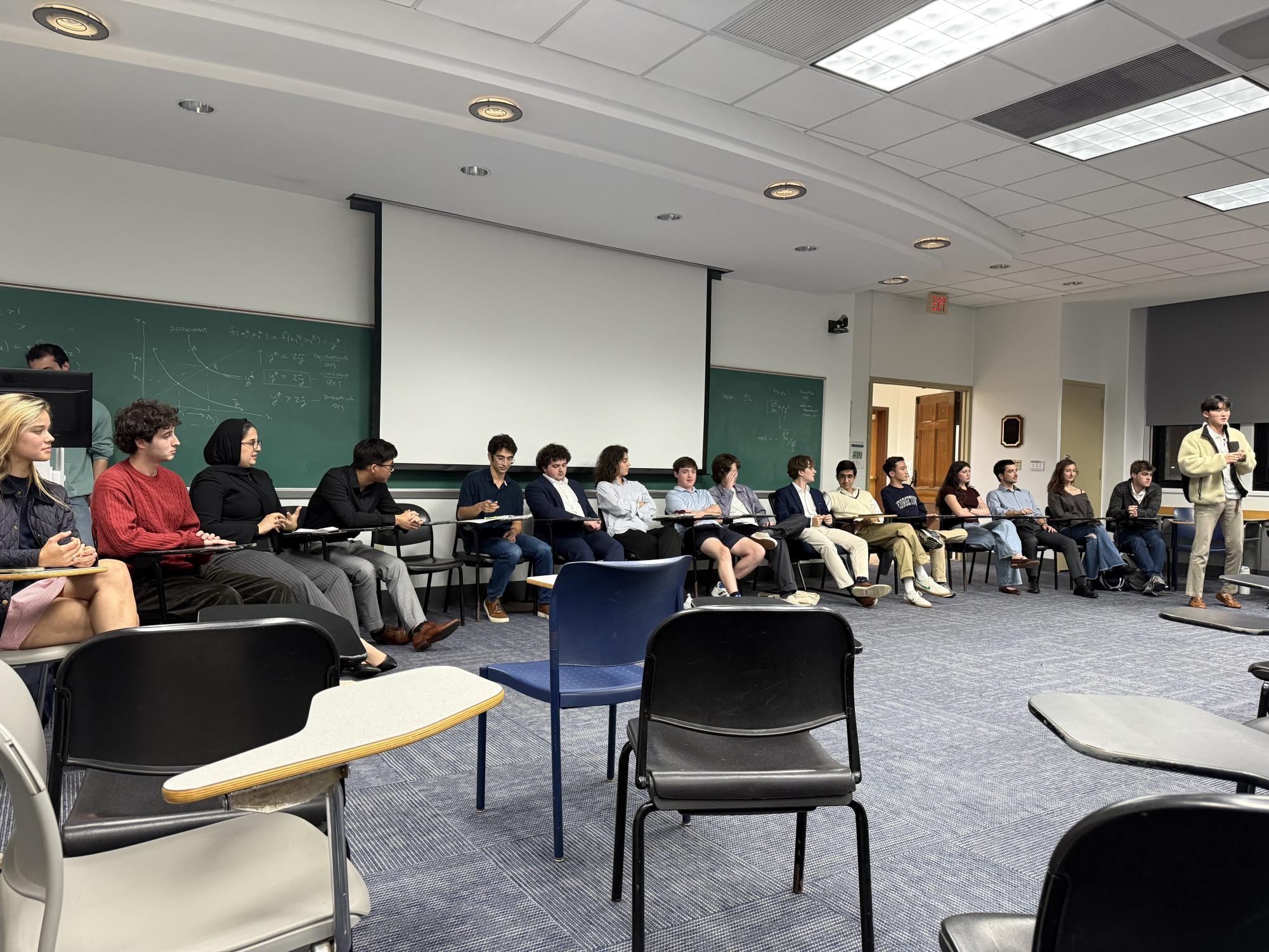Georgetown University Student Association (GUSA) president and senate candidates debated student life, dining and policy issues at town halls Oct. 21 and 22.
The GUSA Election Commission, which oversees and regulates elections, hosted the town halls to allow students to ask the candidates questions about their platforms. At the Oct. 21 town hall, 24 of the 26 candidates for the seven open first-year senate positions discussed their priorities for representing the Class of 2029.

Constantine Filippatos (SFS ʼ29) said first-year senators should approach the issues they campaign on practically.
“I think we have to be realistic,” Filippatos said at the event. “The biggest issues are not the ones to be solved by the freshmen senators. We have to focus on the things which are realistic, which will actually have an impact on the population.”
Roye Ganju (SFS ʼ29) said first-year senators should prioritize increasing student engagement with GUSA.
“I think the biggest issue is that while we can get legislation, all of these things written, and maybe even get an impact, chances are most students won’t know,” Ganju said at the event. “GUSA elections have extremely low turnout — down to 30%. 70% of students, frankly, don’t care and they do not know.”
Dima Al-Quzwini (SFS ʼ29) said she would work to engage with students to create legislation instead of relying on her own experiences if elected.
“Each of us have individual experiences and we’re telling you what we think is important,” Al-Quzwini said at the event. “But who am I to tell you, an individual student at this university, what you want to be fixed? I want you to tell me.”
At the Oct. 22 town hall, presidential candidates Saahil Rao (SFS ʼ27) and Darius Wagner (CAS ʼ27) spoke about their platforms. Luke Hughes (SFS ʼ27), the third presidential candidate, did not attend the town hall because he is studying abroad in Australia this semester.
Wagner, who is currently the GUSA vice president, said he believes experience in student government is important to ensuring effective leadership within GUSA.
“I think it’s good for the student body that we have the opportunity to elect people that have been doing the work, that have experience doing that work — that institutional memory of continuation is really important,” Wagner said at the event. “We do disagree with some approaches, but I think it’s better for the student body that there’s at least, hopefully, someone who has had that experience.”
When the candidates were asked if they would remain involved with GUSA if they lost the election, Rao and Wagner both said they would continue to support GUSA and leadership transitions.
Rao, who is currently the speaker of the GUSA senate, said he will work with the new speaker to ensure a smooth transition if he loses the election.
“If I lose, my number one priority will be giving the new speaker a better transition and kind of telling them the secrets of the job because it’s a pretty powerful position,” Rao said.
Wagner said that if he loses the election, he would support the next administration by sharing resources from his and GUSA President Ethan Henshaw’s (CAS ʼ26) administration.
“I will do everything in my power to ensure, if I do lose, that they get all the contacts we have, that they have transition documents, that they have updates of where we made progress and my phone will also be available if they have questions about anything,” Wagner said at the event.
Four of the nine candidates for the at-large senate positions attended the Oct. 22 town hall. Luke Schneeman (CAS ʼ28), Shae McInnis (CAS ʼ28), Shea O’Day (CAS ʼ26), Scotty Lichamer (CAS ʼ26) and Wassan Abdelkarim (CAS ʼ28) did not attend.
At the town hall, Nico Santiago (CAS ʼ27) said he will continue his work on the Ethics and Oversight committee, which focuses on GUSA’s internal operations and upholds accountability among GUSA members.
“I’ve served as the head of the Ethics and Oversight committee this past term in GUSA, which oversees GUSA’s internal reform and accountability efforts, and I will remain committed to ensuring that GUSA is as efficient and effective as possible, so that we can be the best advocates that we can be for the student body,” Santiago said at the event.
Evan Cornell (CAS ʼ27), who attended the meeting virtually, said he hopes to better communicate GUSA’s accomplishments with students.
“I think one of the most important things is bringing the wins that we make in GUSA to the student body,” Cornell said at the meeting. “I think there’s a misconception that GUSA doesn’t do much. GUSA does a lot week in, week out.”
Kat Scarborough (CAS ʼ26) said she will work to make student organizations more inclusive by removing some class-year restrictions that prohibit upperclassmen from joining.
“I’m a big fan of potentially not doing class restrictions,” Scarborough said at the event. “I know a lot of clubs have a very strong culture of if you’re a junior or senior, it’s too late. I would love to challenge that. It’s never too late for any student, because every student — and I’ve learned this as an Escape leader — every student has such a different journey at Georgetown and I’d love to honor every single version of that journey.”
Cornell said senators should engage more directly with students on campus.
“We have seven, eight thousand students on this campus and I think getting those ideas from them is very important,” Cornell said. “I think one of the ways we can do that is more flyering. We can do more tabling. We, as GUSA senators, can do more work on the ground, besides just meeting on Sundays — I think there’s so much more we can do.”